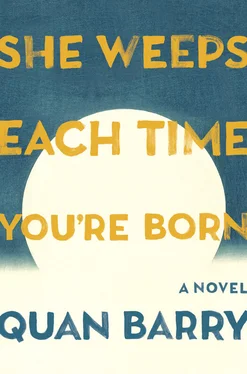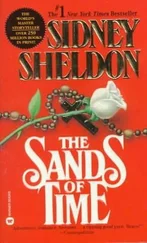They lay in the darkness, Bà on a mat by the cart wondering where her pipe was, if her dead hand had dropped it somewhere in the brush. She could feel the cold metal of the cleaver tucked safely under her head. In the early part of the night, she dreamed of a wedding party walking through a minefield. The bride was the first to step on one. The noise of the explosion sent a cloud of white doves rocketing up out of the dead trees. The guests froze in place except for the flower girl, who continued to swing her tin bucket as she skipped along through the elephant grass. The child dipping her fingers in the milky white sap, then flicking the droplets into the air.
Qui woke up after midnight. Her braids lay in coils on the ground. Beside her the child was still awake, Rabbit’s eyes focused on something remote. Qui looked off to where she was staring. After a moment she too could see it, a light dancing in the distance. It quivered like fire but was the wrong color, the flame a steely blue.
Gently Qui put a hand on Rabbit’s face and closed her eyes. After a while they stayed shut. The old women were asleep. Qui was mindful not to wake them. She slipped the cleaver out from beneath Bà’s head, careful not to pull her hair, then moved toward the flame. It was farther off than she’d thought, the little blue light always winking just up ahead.
When she arrived, Qui could smell something cooking. Her stomach rumbled. It smelled like catfish and lemongrass. They looked up. None of them were surprised that she should be coming out of the forest — a young girl carrying a cleaver, her hair snaking down her back, her exquisite face as if carved from moonlight. The man in the group said something she didn’t understand. He tried again in broken Vietnamese. You VC? She shook her head. He pointed to a spot next to where the fish was cooking over a small blue flame. She sat.
There were more than ten of them, a family of Bana. The women wore the traditional skirts, each one long and black with a panel of colorful red embroidery around the middle. The man was shirtless, his loose pants made of the same dark material. They talked in their own language. She couldn’t be sure which ones were his wives, which his sisters.
The fire was starting to wind down. A woman sat shaping a lump of clay into a small gray ball. When it was good enough, she tossed it into the flames and for a moment the fire sparked a pale blue as the ball ignited and began to burn. Qui could feel her mouth watering.
The man said they had crossed a bridge made from the bodies of the dead, corpses strung together to make a way. Two days ago Buon Me Thuot falls, he said in broken Vietnamese. Route 7 is a river of despair. Do you know what this means, he asked. Qui nodded, but he said it anyway. It means we are dead.
The front of Qui’s shirt suddenly went wet in the blue light. She could feel the hot milk dribbling down her stomach. One of the women noticed. Without a word she got up from her seat and disappeared into the darkness. The woman came back carrying a sleeping child. His face seemed older than Rabbit’s, almost wizened, but his body was smaller, less than what it should have been.
Qui lifted her shirt. Instinctually the sleeping child took her breast in his mouth. His lips were dry and chafed her nipple. Qui tried to stifle a sigh. The rapture of a foreign mouth on her body, a hunger she could satisfy.
In the light of day if the little Bana boy could have described his dreams to his mother and aunts, he would have told them fabulous tales of leaf-nosed bats and the long white tongue of the full rabbit moon. He would have told them about a dead woman glowing six feet below ground with a pearl gripped tight in her hands, all through the air the scent of honey. He took as much as he wanted, and still there was more. Soon the milk spilled from the corners of his mouth. In the days and weeks to come, his face shone with a new glory. His form filled out, skin radiant and supple, soft as down. After his midnight suckling at the stranger’s teat, he was never sick a single day for the rest of his natural life.
In the morning the world was dewy and bright. Qui lay on the mat next to Rabbit in the middle of the trail where they had gone to sleep. The cart still stood where they’d left it loaded with their possessions, condensation glistening on the jars. The cleaver was back under Bà’s head.
Qui sat up and stretched. The old women were already awake. They had slept on top of a hill. Through the dead trees she could see down to where the Serepok had run dry. If she turned east she could just make out a wide horizon where the world seemed to come to an end. She picked Rabbit up and walked to the edge of the hill and lifted her shirt, the baby’s face flushed from a restless night. Qui closed her eyes, then the familiar feeling of light issuing out of the body. Water rushing downhill to find itself.
Overhead scavengers were already circling for the scent of rot. Huyen watched the birds sail in rings on the wind. All that was left to do was pack up. They had another long day before them. One by one the old woman picked up their bamboo mats. Under Qui and Rabbit’s there was something in the ground. Huyen brushed back the dirt with her foot. She didn’t blanch when she saw what it was.
It was a face, the eyes still open. For a moment she considered digging further to see if she could find a gun. What is it, said Bà, her heart gone cold, but already Huyen was covering it back up.
They traveled all day over the highlands toward Nha Trang on the coast. Bà lay in the cart with her useless body, the baby nestled in her lap. Huyen hobbled forward on foot. The smell of salt sharpened in the air, the land leveling down. On this side of the mountain the populace lived on the ocean, the people fishermen and their business the business of fishing. Qui thought of the Bana family she had met in the woods. We are dead, the man had said, the man with his stories of crossing the Song Den on the backs of corpses. Like stepping on logs only softer, he’d added. Qui kept walking, the blisters on her hands starting to bleed. One of the women had described how you could feel the soft dents growing on the backs of the dead, like bruises on fruit. Spots where the bodies had been stepped on repeatedly.
Years ago in Cong Heo, Qui had heard stories about the NVA using peasants to ford streams. How the Americans would send fighter jets to bomb an area, houses and roads and animals all destroyed for the sake of a single bridge. Little did they know that by nightfall the rivers were again being crossed. By the light of the moon the peasants would stand shoulder to shoulder in the muddy waters, then bend over, their backs like wooden planks. Entire villages were lined up, even the elderly, each becoming a single stone in the human road. Then the NVA would roll a series of bicycles over the living bridge, bicycles loaded with rice and ammunition and medicine.
For the third day in a row Huyen was chewing the same betel leaves, the leaves long stripped of their punch. She looked up into the blue sky. A white bird floated in the air. It was a seabird. She could tell by the wide yellow feet and the fact that the bird stayed close to earth. In the distance a haze hung over the far horizon, the line indistinct between the sky and the South China Sea. Everywhere flocks of the little white birds with the wide yellow feet swirled in the air.
From the back of the cart Bà grunted and lifted her right hand. By the side of the trail there was a dragon-fruit tree growing in a ditch, each prickly arm green and spidery. They were succulents, a kind of cactus, the fruit itself magenta though the flesh was white and speckled with small black seeds. Huyen walked over and picked one. She peeled back the thick pink petals and bit into it, chewing a little before spitting the mush back out into her hand and offering it to Bà.
Читать дальше












